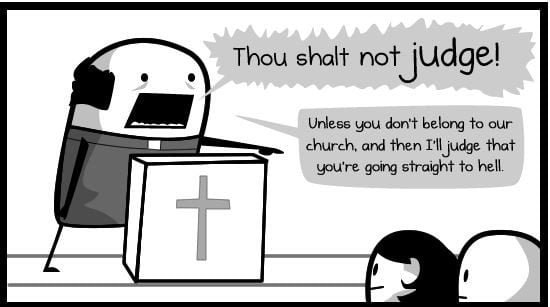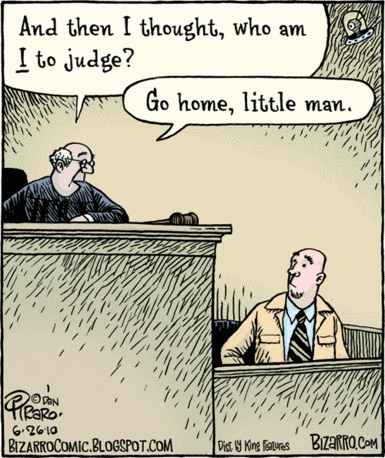
The short answer is this: no, it doesn’t.
And if it actually did, it is the one command every Christian breaks on a daily basis.
I am sure you have been in one of THOSE arguments, debates, or discussions; the one where you express your opinion about a matter and someone shrieks, YOU ARE JUDGING!
Why of course you are judging.
We all judge each and every day of our lives. Common sense tells us this is so.
People who use the stop judging line are trying to control the debate and stifle any opinion other than their own. If you agree with the person you are a wonderful person, but if you disagree with them you are judgmental.
I wish these don’t judge people would at least be honest when they open their mouths, post something on Facebook, write a blog post, etc. They need to preface each public pronouncement with:
I am not interested in what you think. If you disagree with me, I will consider you to be a judgmental person, and if you continue, I might even throw a fit, and if you really, really keep at it, I will SHOW you . . . I will unfriend you on Facebook. TAKE THAT!
Let’s settle one thing right here, right now. You judge, I judge, we all judge. What matters is HOW we judge, what standard we use for judging.
And that, by the way, is exactly what the Bible says.
Evangelical Christians, by far, are the whiniest people on earth when it comes to judging. With Bible in hand, they make all sorts of judgments. They judge who is saved and who is lost. They judge what sin is and isn’t, and they really like to judge sexual sin (a sign that they have not gotten laid lately).
Yet, when others turn their judgment back on their heads, they loudly protest, saying, the BIBLE says, thou shalt not judge.
Let’s look at what the Bible actually says:
Judge not, that ye be not judged. For with what judgment ye judge, ye shall be judged: and with what measure ye mete, it shall be measured to you again. And why beholdest thou the mote that is in thy brother’s eye, but considerest not the beam that is in thine own eye? Or how wilt thou say to thy brother, Let me pull out the mote out of thine eye; and, behold, a beam is in thine own eye? Thou hypocrite, first cast out the beam out of thine own eye; and then shalt thou see clearly to cast out the mote out of thy brother’s eye. (Matthew 7:1-5)
Most people stop at Matthew 7:1. Judge not, that ye be not judged.
Seems pretty clear, doesn’t it? Don’t judge others if you don’t want to be judged yourself.
This one verse is foundational for those who think we should tolerate any and every belief a person might have. The toleration at all costs crowd thinks every person is autonomous and has a right to say whatever he or she wants. Free speech reigns paramount. And that’s true. However, that does preclude others from saying your beliefs are irrational, anti-science, racist, bigoted, hateful, stupid, ignorant, hilarious, or that you personally are full of shit. Free speech applies to everyone, does it not?
Generally, I think toleration is a good idea, but when individuals or groups bring their ideas into the public square, any notion of toleration must be put aside. In a democracy like ours, we fight our battles in the public arena. Citizens bring their ideas to the public square in the hope of finding like-minded people to join their cause. Often they do, but in the public square they also find those who oppose their cause. And so competing causes, ideas, and beliefs clash with one another and wage war against each other in the public square. Over time, it is hoped the best cause, idea, or belief wins (and I speak with gross generalization here).
It is likely the winner’s cause, idea, or belief will have been altered by those who challenged it. Through this bloody give and take, we progress and move forward as a people.
Religion does not play well in this kind of environment. Religion is based on revealed truth, on dogma. In the United States, the dominant religion is Christianity, a religion founded on truth that cannot be altered or changed. This is why Christians do not fare well in the public square. They have little capacity for change. To contemplate change, they have to consider that they or their God are wrong. Now we know, as we look through the lens of 2,000 years of Christian history, that the Church has indeed adapted and changed. But, it should be noted that this kind of change takes a much longer time than it does with other people and groups. Christianity is nothing if not arrogant and intractable about its truth.
On the other hand, the scientific method fits well in this kind of environment. Scientist A says _____________________, and Scientists B, C, and D take exception, and through the scientific method set out to challenge, refute, or modify what Scientist A said. It doesn’t take centuries to root out error.
Note what the Bible says in Matthew 7:2-5, the verses few Christians ever bother to read. (Many Christians subscribe to the ignore what doesn’t fit my agenda, worldview, way I want to live, or my personal rules of interpretation.)
Verse 2 says:
For with what judgment ye judge, ye shall be judged: and with what measure ye mete, it shall be measured to you again.
For WITH WHAT JUDGMENT YE JUDGE, ye shall be judged. The Bible is quite clear. It is a given, we all make judgments, so when we judge, whatever standard of judgment we use, that same standard of judgment will be used by others when they judge us.
The Bible even addresses the method we use to judge when it says with what measure ye mete, it shall be measured to you again. In modern vernacular the Bible is saying, however you dish out judgment, expect it to be dished back to you the same way.
Over the course of my thirteen years of blogging, people have left tens of thousands of comments on various iterations of this blog. Currently, almost 30,000 comments have been left on this blog since December 2014. A small percentage of comments were left by Evangelical Christians with nasty dispositions, people who were so filled with certainty that they had no tolerance for any differing viewpoint. (I can count on one hand the non-Christians who acted similarly.) They knew the truth and their objective was to tell me that I was wrong, deceived, blind, lost, headed for Hell, an enemy of God, etc. In their worldview, there is no room for doubt or not knowing.
These know-it-all Christians tend to be arrogant, bombastic, and lacking in basic social graces. Of all the different types of people I have met on the Internet, theirs is the type that most often gets under my skin (perhaps because I was just like them at one time in my life). At one time, I responded “in kind” to this kind of commenter. Using Bible terms, I just meted out to them what they meted out to me. These days, I tend to follow another biblical admonition: don’t cast your pearls before swine.
Well, enough of chasing that rabbit trail. (The preacher in me still lives.) Back to Matthew 7:1-5.
Verses 3 and 4 say:
And why beholdest thou the mote that is in thy brother’s eye, but considerest not the beam that is in thine own eye?Or how wilt thou say to thy brother, Let me pull out the mote out of thine eye; and, behold, a beam is in thine own eye?
The Bible teaches that we should first consider our own lives, our own faults, our own inconsistencies, and for my Christian readers, our own sins, before we consider the deficiencies of others.
As is often the case, we tend to be able to see the smallest of matters in the lives of others (the mote, the small sliver), all the while not being able to see the biggest of matters in our own lives (the beam). Before we judge others, we should carefully judge ourselves, engaging in self-reflection – taking an inventory of our own lives. As the old Baptist evangelist once said, draw a circle on the floor, stand in the middle of the circle, and judge everyone in the circle. This kind of judgment will fundamentally change how we judge others. As we carefully plumb the depths of our own being, we will likely become more understanding of those with whom we disagree. This doesn’t make the disagreements go away, but it does help us to see that we are ALL capable of embracing ideas that are faulty or dangerous.

Does this mean we shouldn’t judge others? Of course not. Notice what verse 5 says:
Thou hypocrite, first cast out the beam out of thine own eye; and then shalt thou see clearly to cast out the mote out of thy brother’s eye.
If we judge ourselves first, we will then be able to better judge the actions, words, ideas, and beliefs of others. The hypocrite ignores his own life and focuses on others. We see this all the time with Evangelical pastors. You know the type: they thunder against sin, most often sexual sin. They eviscerate all those who dare transgress the Bible’s sexual standard. Yet, in their own lives, they do the very things they condemn. (Ted Haggard, Jimmy Swaggart, Bob Gray, Jack Hyles, Benny Hinn, Paul Crouch, Jim Bakker, Eddie Long, and too many Catholic priests to count, just to name a few. Please see the Black Collar Crime Series.)
I am of the opinion that those who shout the loudest over the peccadilloes of others often commit those very same sins in the privacy of their home, office, motel room, or back seat of their car. They are hypocrites of the first degree.
The Bible, from start to finish, clearly teaches that Christians are to judge others. It never teaches, thou shalt not judge. It DOES teach judging righteously. It does teach using a proper standard of judgment. It does teach a judgment that begins with self.
“But, Bruce, you are not a Christian.” No, I am not. I wrote this post to tell those Christians who love to scream “DON’T judge” to shut the Hell up. They need to read the Bible they say they believe. Better yet, they need to PRACTICE the teachings of the Bible they say they believe.
As an atheist, I can glean some helpful guidance from Matthew 7:1-5. It stresses the importance of self-judgment before taking on the task of judging others and their ideas and beliefs. I need to be reminded of my own shortcomings (sorry Christians, no sins for me) and motives. I need to be reminded that I am, as those I oppose, a fallible, frail human being. I can be w-r-o-n-g.
The comment section awaits your judgments of this post.
Bruce Gerencser, 66, lives in rural Northwest Ohio with his wife of 45 years. He and his wife have six grown children and thirteen grandchildren. Bruce pastored Evangelical churches for twenty-five years in Ohio, Texas, and Michigan. Bruce left the ministry in 2005, and in 2008 he left Christianity. Bruce is now a humanist and an atheist.
Connect with me on social media:
Your comments are welcome and appreciated. All first-time comments are moderated. Please read the commenting rules before commenting.
You can email Bruce via the Contact Form.



